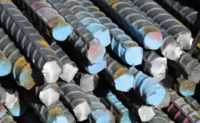A long-standing dispute over pricing of Canadian lumber shipments to the U.S. is entering a contentious phase once again, with the U.S. Commerce Dept.'s decision to set final tariff rates as high as 23.76% on the imports.
Commerce's decision, announced on Nov. 2, sets final antidumping duties ranging from 3.2% to 8.89%, depending on the Canadian lumber-producing company. The department also set countervailing duties ranging from 3.34% to 18.19%.
U.S. lumber interests, which launched the tariff proceeding last year, welcomed the Commerce decision, but Canadian officials sharply criticized it and threatened to take legal action in trade forums.
Commerce will direct the U.S. Customs and Border Protection agency to collect cash deposits, based on those rates, from importers of Canadian lumber.
The two sides had been negotiating off and on for months, trying to reach a long-term lumber trade pact. But Commerce said, "The parties were unable to agree upon terms that were mutually acceptable." Canada's 2016 lumber exports to the U.S. were estimated at $5.66 billion.
The U.S. Lumber Coalition, one of the parties that filed the trade action, welcomed Commerce's action. Jason Brochu, the coalition's co-chair, said, "We are pleased that the U.S. government is enforcing our trade laws so that the U.S. lumber industry can compete on a level playing field."
Brochu, who also is co-president of Pleasant River Lumber Co., Dover-Foxcroft, Maine, added, "The massive subsidies the Canadian government provides to their lumber industries have caused real harm to U.S. producers and their workers."
Canada Threatens Litigation
in a joint statement, Chrystia Freeland, Canada's minister of foreign affairs, and Jim Carr, minister of natural resources, said Commerce's action "is unfair, unwarranted and deeply troubling." They called the duty levels "punitive."
Canada will defend its industry, "including through litigation, and we expect to prevail as we have in the past," said Freeland and Carr.
They added, "We are reviewing our options, including legal action through the North American Free Trade Agreement and the World Trade Organization, and we will not delay in taking action."
Susan Yurkovich, president of the Vancouver-based BC Lumber Trade Council, noted in a statement that the final rates are lower than those Commerce proposed earlier, but she added, "The fact that any duties remain in place is disappointing."
Yurkovich observed, "As we have consistently said, these duties are unwarranted, and this trade action is completely without merit."
National Association of Home Builders Chairman Granger MacDonald decried Commerce's decision, saying in a blog post that it "could not have come at a worse time."
MacDonald noted that U.S. homebuilders are busy with reconstruction work in the wake of recent hurricanes and wildfires and said the new tariff on Canadian lumber will hurt housing affordability and artificially raise lumber prices.
In the next step of the process, the U.S. International Trade Commission will make a final determination on whether Canadian imports have harmed U.S. lumber producers. The commission's action is expected by Dec. 18.
Story corrected on 11/10 to say tariff rates would be as high as 23.76%.



Post a comment to this article
Report Abusive Comment